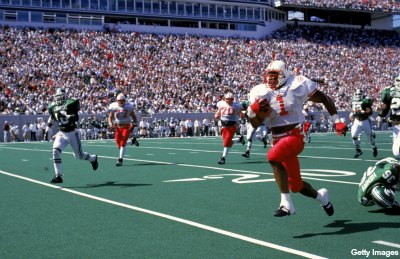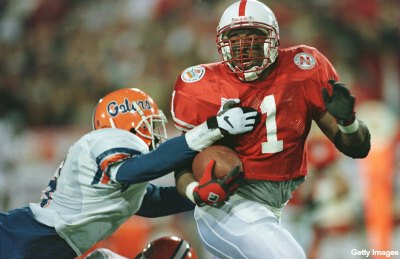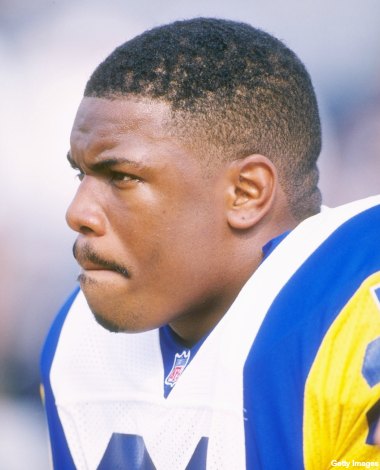Everybody knew the violence inside Lawrence Phillips would eventually be his undoing. But few could have predicted this: Phillips, 40, was found unresponsive on the floor of his California state prison, where he was serving a 31-year sentence for a handful of convictions, including domestic violence and false imprisonment.
Phillips was also being investigated for the possible murder of his former cellmate earlier this year. On Tuesday, a preliminary hearing found that there was "sufficient cause to believe" that Phillips was guilty of the crime. A conviction likely would have led to the death penalty.

Some of the facts are yet to come, but it's reasonable to think that Phillips took his own life in response to his grim outlook. He had previously written to his mother, in a letter sent one month before his cellmate's death, that he was worried he couldn't control the violence boiling up inside of him, and that he feared it would lead to someone's death, or even his own.
On both counts, he was right.
So that's the end for Phillips, one of his generation's greatest football talents, and one of its saddest stories of a bright future squandered. No single act brought Phillips to this grim end. The former running back was slowly crushed under the weight of who he repeatedly proved himself to be.
For more than 20 years, Phillips has been finding his way into trouble -- not just mischief, but violent, ugly incidents. He was a star at the University of Nebraska, but also its most controversial figure, and at a time when the football program's scrutiny was as high as ever.
In 1995, Phillips was part of what some consider the greatest college football team ever assembled. He was the star running back on a team that probably could have still won it all without him. And during the season, he put his career in jeopardy by dragging his girlfriend down a staircase -- and by her hair, no less.

Phillips was suspended by then-coach Tom Osborne, only to be reinstated in time for the national championship game. The decision might be Osborne's most questionable decision as a head coach. Nebraska beat Florida 62-24, and Phillips ran for 165 yards. But Phillips' future might have suffered from the decision, which relieved the young man's much-needed punishment and set him up to repeat his mistakes.
And oh, boy, did he repeat them. Being drafted No. 6 overall by the St. Louis Rams seemed to give Phillips a fresh start, but his quickly turned his situation sour. The list of minor and major offenses committed is both exhausting and redundant.
A quick summary will do: Phillips was turning into a dominant NFL running back, but his legal problems persisted. By mid-November of his second season, he had exceeded his rushing figures from his rookie year, spent 23 total days in jail, and saw the team release him even as his coach tearfully called him the best running back he had ever coached.
That's how much trouble Lawrence Phillips was.
He continued to get chances from the NFL, despite his continual run-ins with police. After a successful stint in NFL Europe, he joined the San Francisco 49ers. In that setting, his violent streak found a new way to manifest itself: His play worsened, his effort declined, and he often refused to block on passing downs. On one such play, he declined to block blitzing Cardinals defensive back Aeneas Williams, who crushed quarterback Steve Young. Young suffered a concussion, and that concussion ended his career.

That season would be Phillips' last in the NFL, and it started what would be a rapid downward spiral, even in the context of his rocky past. In 2005, Phillips was wanted by San Diego police for two separate domestic-abuse incidents when he tried to run over three teenagers with his car. Phillips had been angered in an argument with the kids, who were playing a game of pick-up football.
He went to jail for that attempted assault, serving a 10-year sentence. In 2009, his domestic abuse charges became convictions, and his sentence increased to 31 years.
Phillips' story figured to quiet down during the term of that long incarceration, but in April 12, 2015, he is alleged to have choked and murdered his cellmate. That act likely guaranteed that Phillips would never leave prison alive.
Even so, his attorney, Jesse Whitten, was blindsided by news that he might have killed himself.
"There was nothing about his demeanor that made me think he was suicidal at all, or depressed," Whitten told USA TODAY. "He was very confident about winning this case and he was even optimistic about his appeal on his prior cases."
His high school coach, who maintained contact with Phillips over the years, had a similar impression.
"It had nothing indicating anything like this," he told USA TODAY. "He was talking about the fact that his mom had gotten him an attorney."
That's how the story of Lawrence Phillips ends -- with another act of violence no one can explain.
If there's a missed opportunity to be mourned alongside the former football star, it's that his life came and went, and no one ever seemed to understand what troubled Lawrence Phillips. Not even himself.





